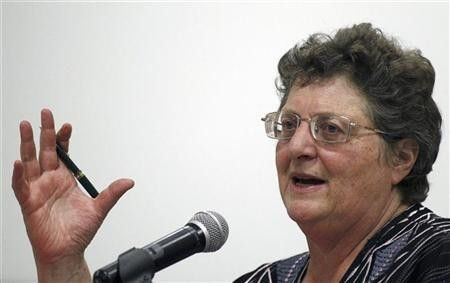SAfrica cbank holds rates, targets inflation

South Africa's Reserve Bank held interest rates on Thursday, choosing to focus on rising inflationary pressures in preference to propping up a sluggish domestic economy as uncertainties clouded the country's future rate path.
The Bank's 7-member monetary policy committee discussed a cut but agreed that keeping the repo rate at a three-decade low of 5.5 percent was appropriate, Governor Gill Marcus told a news conference.
Marcus said the economic recovery remained hesitant but inflation was a concern, while the worsening global outlook and the euro zone debt crisis made for an unclear environment for emerging market investments.
Certainly there was discussion about whether a rate cut was appropriate at this point... On balance, we felt it was appropriate to hold given all of the issues that are prevailing, Marcus said.
So (there was) a unanimous decision on hold, but certainly a strong consideration whether we should cut or not.
The majority of 26 economists polled by Reuters last Friday saw the rate holding steady, with just two expecting a 50 basis point cut to a new all-time low of 5.0 percent.
Rising costs of imports would likely drive annual consumer price inflation above the upper end of the bank's 3-6 percent target range in the final quarter of 2011, and inflation would peak at 6.3 percent in the first quarter of 2012, slightly higher than the 6.2 percent seen in September, the bank said.
Inflation would now return to the target in the last quarter of 2012, and not the second quarter as predicted at the September policy meeting.
Food prices continued to pose an upside risk to the inflation outlook, and a further acceleration of food inflation was expected in the near term.
HESITANT RECOVERY
The Bank slashed rates by a cumulative 650 basis points in the two years to November 2010 to help boost expansion in Africa's largest economy, but has kept them on hold at all its six policy meetings this year.
The euro zone debt crisis continued to weigh negatively on the global economic outlook and heightened uncertainty had implications for capital flows and exchange rates in emerging markets, Marcus said.
The domestic economic recovery remained hesitant, with the Bank seeing GDP up 3.0 percent in 2011 against the Treasury's forecast of 3.1 percent.
Expectations among some market players that sluggish growth offered the chance of at least one more rate cut boosted the debt market recently, but bonds gave up earlier gains after Thursday's announcement, nudging yields higher.
Diminished hopes of lower rates boosted the rand against the dollar. The South African currency has fallen sharply this year.
For the moment it looks as though (the Reserve Bank) will maintain their wait-and-see approach, Nedbank Chief Economist Dennis Dykes said.
But any clear indication that the economy is starting to suffer as a result of what is happening internationally could still provoke a cut in interest rates over the next couple of meetings.
Marcus said uncertainty on the rand exchange rate, which has been volatile as the euro zone debt crisis keeps investors nervous about risky emerging market assets, posed an upside risk to the inflation outlook.
The impact was likely to be relatively limited and should dissipate in the short to medium term.
However the Committee is concerned that the change in the profile of the inflation forecasts, and the extended breach of the upper end of the inflation target range, may impact adversely on inflation expectations, she added.
© Copyright Thomson Reuters {{Year}}. All rights reserved.





















